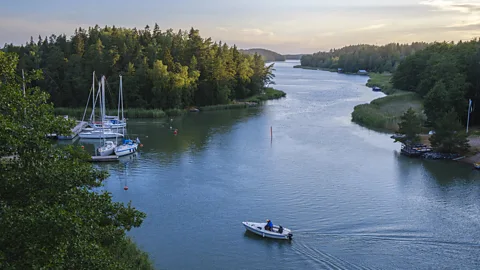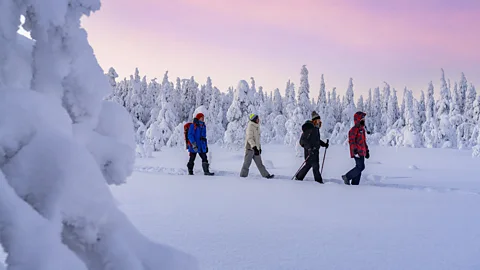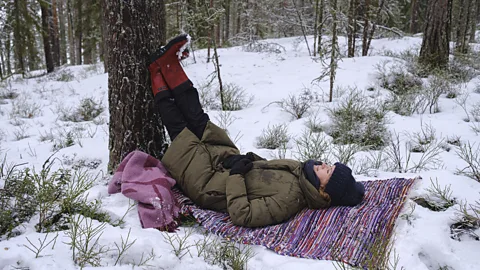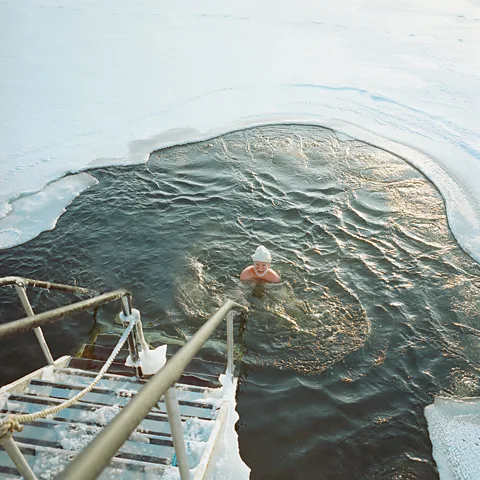What it's like to live in the happiest country on Earth
 Tim Bird
Tim BirdFinland has topped the World Happiness Rankings for the eighth year running – but the real appeal for travellers lies in the country's deeply-lived values of balance, nature and everyday contentment.
Finns tend to accept the accolade of supreme happiness, bestowed on them by the UN's World Happiness Report in March 2025 for the eighth time in a row, with a collective shrug and eye roll. But Finnish travel operators are celebrating as travellers increasingly make the connection between Finland and happiness, hoping to come and experience that Finnish brand of happiness for themselves.
However, don't expect to be greeted with howls of laughter and cheerful quips when you land at Helsinki Airport or disembark from one of the Baltic ferries in the capital's harbour. There is some truth in the perception of Finland being a no-nonsense, down-to-earth kind of nation. Generally, Finns are flattered – happy, even – to be honoured by the report's conclusions, but while graciously accepting them, they feel "happiness" isn't really the right word. Instead, "contentment", "fulfilment" or "life satisfaction" are widely considered more appropriate terms. As Finnish President Alexander Stubb recently posted on Facebook: "No one can be happy all the time, and sometimes circumstance makes it difficult. But getting the basics right – security, freedom and equality – is a good start."
But while the concept of happiness in Finland may be nuanced and culturally specific, it is deeply embedded in the fabric of daily life. Rather than seeking constant highs, the Finnish approach is rooted in balance, connection and quiet contentment – qualities that increasingly resonate with visitors. And for travellers, this state of being is not just something to observe but one to get involved with first-hand, through embracing the country's nature, sauna culture, food, sustainable design and lifestyle.
"We see Finnish happiness as a summary of these five elements," says Teemu Ahola, director of international operations at Visit Finland, "but we don't measure or collect data to evaluate happiness as a single attraction in itself".
 Getty Images
Getty ImagesTo experience these tangible, authentic aspects of Finnish life that underpin its consistent happiness ranking, Ahola suggests Finnish sauna culture as an increasingly popular, most globally identifiable attraction; and stresses that Finland is a safe country, naming the risk of bumping into free-roaming reindeer in northern Lapland as one of the few potential hazards for visiting tourists. Meanwhile, he adds, a new and confident generation of Finnish chefs has earned international respect for and interest in the Finnish culinary scene.
2025's Happiest Countries
The 2025 top 10 happiest countries, in descending order, consist of Finland, Denmark, Iceland, Sweden, the Netherlands, Costa Rica, Norway, Israel, Luxembourg and Mexico. The Report's findings are based on Gallup poll scores for inequality (or absence thereof), social support, GDP per capita, life expectancy, freedom, generosity, perceptions of corruption, positive emotions, and willingness to donate and volunteer. "Caring and Sharing" were chosen as general themes for the 2025 report, timely reminders of the societal virtues of empathy and community.
Finland is home to the world's northernmost Michelin star restaurant, Tapio, in Ruka-Kuusamo; and the Saimaa Lakeland region was named a European Region of Gastronomy in 2024. Many restaurants across Helsinki celebrate the edible riches – mushrooms, berries, fish and game – that are accessible to all in the country's endless forests, coastal archipelagos and inland waterways through Finland's Jokaisenoikeudet or "Everyman's Right", a law that grants everyone the freedom to roam and forage.
Connect with nature
Helsinki, where most visitors start or end their trip, offers a first-hand glimpse of this national contentment. This is a seaside city, spread over a beautiful natural archipelago and reclaimed land. It's easy to grab a city bike from one of the dozens of stands around town and head off to explore the coast-hugging cycling routes or disappear into Central Park, a belt of forest that stretches from the city centre to its northern periphery.
The endorphin boost experienced by this kind of freewheeling adventure and access to plentiful natural resources ties directly into the UN's happiness metrics of life expectancy, freedom and positive emotions. This connection can be found at the heart of SaimaaLife, a nature and wellness company in eastern Finland's sprawling Saimaa Lakeland region, run by mental health expert and guide Mari Ahonen.
Ahonen is an enthusiastic advocate of the mental balance that Finnish nature and lifestyle have to offer and leads her guests through shinrin-yoku (forest bathing), traditional lakeside saunas, wild swimming, foraging trips for mushrooms and berries and cooking over an open fire.
 Tim Bird
Tim Bird"We Finns can be too modest," she says. "We should notice the World Happiness status in a positive way. I'm a living example of having been able to develop a business with the support that has been available for my entrepreneurship. Some people say it's a lottery win to be born in Finland."
A lottery win, that is, in the form of life satisfaction and balance; of living comfortably and having "enough" in a material sense. This ceiling of expectation shouldn't be confused with a lack of ambition or resourcefulness. After all, this is the birthplace of mobile communications pioneer Nokia, the distinctive garden tool and scissor brand Fiskars and textile and clothing icon Marimekko.
Stoic and stubborn
Finland isn't immune from economic pressure or controversies, however, and the long, dark winters can put a strain on mental health. The Finnish idea of happiness also includes a dose of sisu: a hard-to-translate concept of resilience, fortitude, courage and grit. Finnish-Canadian author Katja Pantzar, who has written extensively about this perceived national quality, explains that it's "a mindset that allows people and communities to work together in the face of challenges rather than give up or blame and attack others".
More like this:
• The 25 best places to travel in 2025
She notes that the top four nations in the World Happiness Report are all Nordic countries with strong welfare systems designed to support the collective good. "Happiness is very culturally specific," she said. "In Finland, there are many examples of everyday happiness that are available and accessible to everyone, whether it's nature – every person in Finland is on average about 200m from the nearest forest, park, seashore or natural body of water – saunas, public libraries, safe and efficient public transport, free clean drinking water, education or healthcare."
 Getty Images
Getty ImagesPantzar also highlights the mood-boosting properties of contrast therapy – hot saunas followed by cold dips – as an accessible, every-day mood booster. "It's incredibly easy to do in Helsinki, surrounded by the sea," she says. "When you don't need to travel great distances or pay large fees to have a quick dip, it's easier to do more regularly, before or after work or on your lunch break."
And while some Finns remain sceptical of the "happiest nation" label, most seem to appreciate what they have. "I don't find it easy to think of Finland as the happiest country in the world," says pensioner Juha Roiha. "In poorer countries like Thailand and Nepal, people seem relaxed in spite of any hardship. In Finland, you might sometimes hear people say that they'd be happier somewhere else. But within ourselves, with what we have, we're happy."
Happy Land - Finding the Inner Finn, a travel memoir by Tim Bird, will be published by Eye Books in the UK in January 2026. It takes a "sideways" look at Finland's happiness status.
--
If you liked this story, sign up for The Essential List newsletter – a handpicked selection of features, videos and can't-miss news, delivered to your inbox twice a week.
